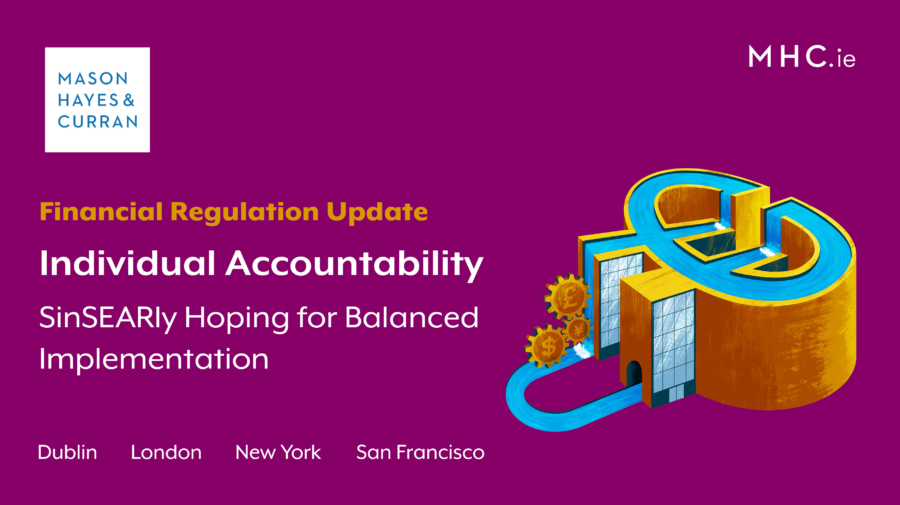
Ireland regularly punches above its weight, as much in financial services as in women’s hockey and men’s rugby, which by contrast get far more positive media attention. Despite the constant barrage of abuse the financial services industry receives, by regularly contributing over 20% of tax receipts on an annual basis and employing over 50,000 people, the sector remains a key driver of Ireland’s economy. For its part, Ireland’s Department of Finance, at least publicly, continues to affirm its commitment to “grow and expand Ireland as a premier European financial centre and a location of choice for specialist international services.”
Words, sadly, are cheap, and Ireland’s official sector must also direct its actions with these noble aspirations in mind. This is the background against which the Central Bank of Ireland’s Consultation Paper on the Individual Accountability Framework (IAF) and Senior Executive Accountability Regime (SEAR), published on 13 March, must be engaged with by industry.
Meat on the bones
Greater accountability for senior bankers has been a buzz term in official circles ever since the 2008 global financial crisis. Indeed, the Biden administration is now seeking further legislative changes in the US in the wake of the collapse of Silicon Valley Bank that could allow bankers that preside over similar failures to be “held to account.” However, as Brooke Masters pointed out in the Financial Times recently, passing laws to “hold bankers to account” is easier than doing so in practice. Ireland’s brand-new IAF-SEAR regime to introduce greater individual accountability for senior executives in the financial sector will therefore be closely watched, not just domestically, but globally.
The general principles of IAF-SEAR have been known for some time and the primary legislation amending the Central Bank Acts to introduce the regime was finalised in early March 2023. Within days, the Central Bank published its draft implementing rules and guidance for public consultation. The Bank’s publication runs to over 200 pages, demonstrating that it has been hard at work throughout the lengthy parliamentary process and intends to waste no time in introducing and enforcing the new regime. Before that happens, industry now has one last chance to influence the detailed rules. The issues at stake are, to put it mildly, critical for the future success and perhaps even survival of Ireland’s cross-border financial industry.
Who should engage and why?
In terms of scope, some 150 credit institutions, insurance undertakings, investment firms and incoming third country branches will be subject to the IAF-SEAR regime. All senior roles, known as pre-approval-controlled functions, or “PCFs”, within these firms will be captured, with no exceptions. The Central Bank has power to rollout IAF-SEAR to other sectors in due course. In the UK, the Financial Conduct Authority modified the regime somewhat when it extended it, recognising the different levels of sophistication and of conduct risk exposure that exist in different sectors. There is no guarantee that the Central Bank will consult extensively again if it decides to roll the regime out to other sectors, so our advice to every financial sector is to engage with the current consultation process, whether you will be impacted in the first wave or not.
Among the key issues that we would highlight from the Central Bank’s Consultation Paper are the clarity that it seeks to bring regarding the concept of “Duty of Responsibility”, under which PCF holders must take “any reasonable steps” to prevent their firm from committing or continuing to commit a regulatory breach. The Consultation Paper provides a non-exhaustive, yet extensive, list of what it considers to be reasonable steps. Firms will need to comment on whether these steps are realistic in the real-world business context, as well as how they will be implemented and evidenced in practice. This will be critical to the enforcement process, since any PCF that is unable to demonstrate that s/he took reasonable steps will be subject to individual enforcement and potential direct sanction by the Central Bank.
Wider economic consequences – your input required
The Central Bank’s Consultation Paper is lengthy and complex. While we do not provide a detailed examination of the issues raised in this article, we do intend to provide a detailed industry briefing in due course before the end of the consultation period. We will also be preparing our own response to the Central Bank’s paper and we would welcome input to that from industry stakeholders and from our clients to inform our own views. The consultation process closes on 13 June, so there is ample time for all stakeholders to engage. We particularly welcome input from our overseas clients and contacts, as it is important that Ireland’s actions in this area are informed by the international perspective.
Conclusion
IAF-SEAR comes with business risks, not just for those it aims to regulate but for the industry. The Central Bank’s Consultation Paper acknowledges as much, stating that “A key potential cost of the new framework would be that it has a deterring effect in relation to the recruitment and retention of high-quality individuals to important roles in the financial system. Were this to happen, it could negatively affect the overall performance of the system and its support of consumers and the wider economy.”
Ireland is highly regarded internationally for its well-educated, highly skilled, and adaptable workforce. This competitive advantage has been vital in making Ireland an attractive location for foreign direct investment and this stream of talent must be maintained. Any sense that the new regime is draconian is likely to make it even more difficult for regulated firms to fill senior roles. At a minimum, the new regime will drive up pay levels for senior executives due to executives’ perception of their greater personal exposure to risk, and this trend has already been observed in the UK.
There is also a risk that even if talent is retained, it will be at the cost of dynamism. Accurate documentation of decisions and the processes behind them is important, but not as an end in itself. The decision-making process needs to be proportionate to the greater objective. Heavy-handed regulation can work in the opposite direction. By way of example, significant regulated firms already find it close to impossible to contract with small tech suppliers, due to the onerous regulatory outsourcing requirements imposed on banks and insurers. If IAF-SEAR creates a climate of fear among senior executives, it will further bureaucratise and slow down decision-making processes, with negative consequences for the industry, consumers, and the economy at large.
Your comments on this article would be greatly welcomed – you can contact the authors directly at lflynn@mhc.ie, scloonan@mhc.ie and smcveigh@mhc.ie.
For more information, contact a member of our Financial Regulation team.
For more information and expert advice on navigating the new regime and its likely impact on your organisation, please contact a member of our Financial Regulation team.








